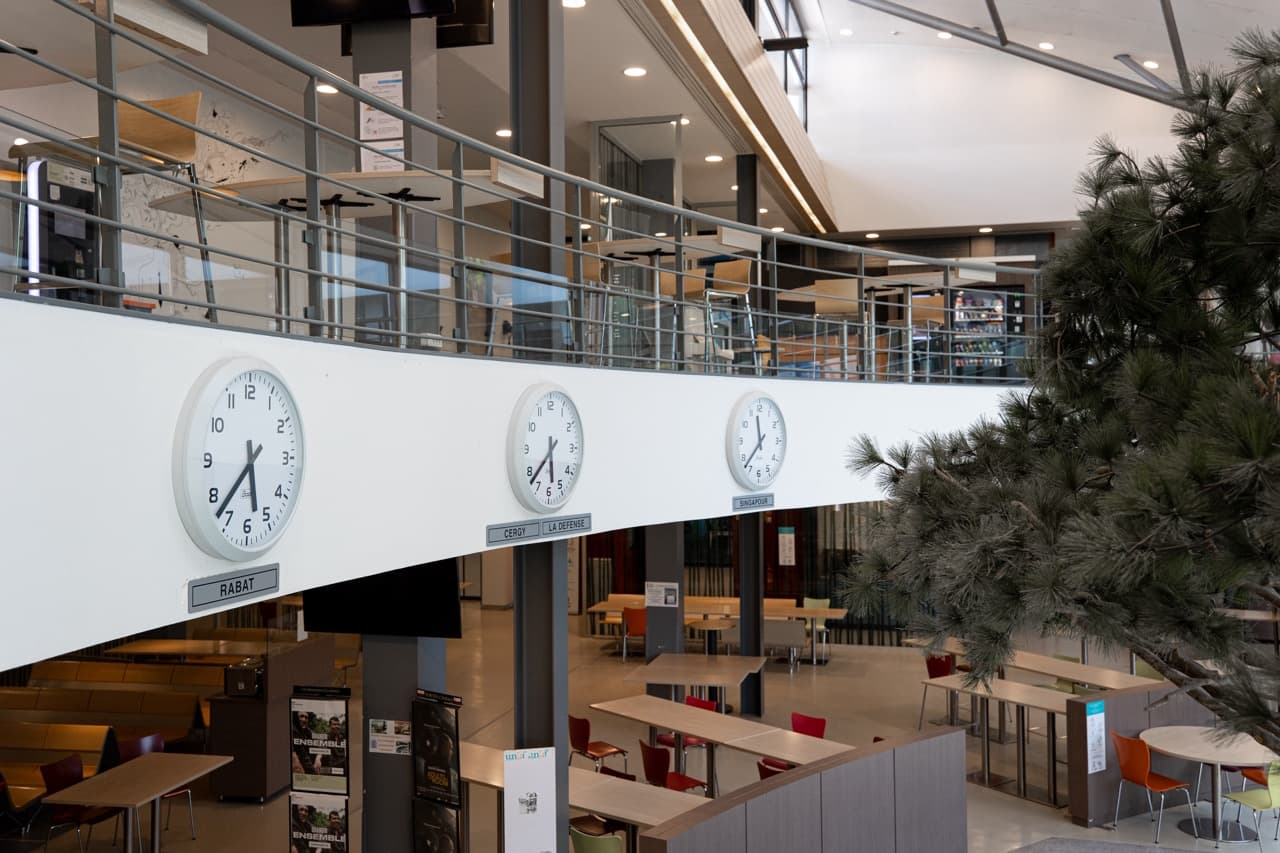ESSEC Business School has made global engagement a cornerstone of its identity and action. In a rapidly changing global environment, our ambition is clear. We educate leaders who understand complexity, act responsibly, and create sustainable impact beyond borders.
This vision is fully aligned with Transcend, ESSEC’s strategic plan through 2028. By opening the world and going beyond geographic, cultural, and disciplinary boundaries, ESSEC deploys an international strategy that serves a transdisciplinary, personalized, and transformative education. It promotes inclusive and multicultural leadership. It advances research that addresses the major challenges of our time.
This strategy is supported by strong international governance. The International Advisory Board of ESSEC is composed of corporate leaders and deans of leading business schools from around the world. It provides recommendations that guide the School’s values and major strategic decisions. It ensures academic excellence and world class research.
With campuses on three continents, a premier academic and corporate network, and a deeply international community, ESSEC pursues one central objective. To position itself as a hub of collective intelligence, connected to the world and focused on the future.
In Europe
In Europe, ESSEC pursues a strong strategy of academic integration. Through its association with CY Cergy Paris Université, ESSEC is a member of the EUTOPIA European alliance. This alliance brings together ten universities committed to a shared vision. Their goal is to build an innovative, ambitious, and sustainable alliance that serves society.
This strategy also includes the European Management Track. This consortium brings together Copenhagen Business School, ESSEC Business School, IE University, and the University of Mannheim. Present in the United Kingdom since 2017, ESSEC has developed its London office into a true academic and professional hub, thereby strengthening the School's visibility and partnerships in the United Kingdom.

North America
In 2024, the business school opened a hub in New York, strengthening its presence in North America and continuing its development through leading partnerships. ESSEC has formalized two consecutive dual degrees with Yale School of Management for students in the Master in Management and the Global MBA programs. Beginning in 2026, a new dual degree will be offered with MIT Sloan School of Management. Students will earn a Master of Science in Management Studies.
These strategic alliances complement long standing partnerships with Berkeley, UCLA, Carnegie Mellon, and Columbia. They provide a transdisciplinary approach at the intersection of management, data, technology, and major societal challenges.

India
In India, ESSEC continues its international development with the launch of the Mumbai Hub. This strategic presence strengthens its position in one of the world’s most dynamic markets. It deepens ties with universities, companies, and alumni. This hub marks the first step of a long term plan. It includes programs developed in partnership with CentraleSupélec. These programs combine management, engineering, and technology to meet the needs of transforming industries.
ESSEC is also expanding collaborations with leading institutions, including the Indian School of Business and IIM Bangalore. A Master in Management dual degree project is under development. With the Mumbai Hub, ESSEC affirms its ambition to actively contribute to the future of management education in India.

China
In China, ESSEC relies on strategic academic partnerships with Shanghai Jiao Tong University since 2016 and with the Guanghua School of Management at Peking University since 2020. These collaborations include dual degree programs for Global BBA students.
The Global BBA is part of Peking University’s Future Leaders program. Its objective is to educate leaders who understand the economic, cultural, and managerial dimensions of the Chinese business environment and can operate with confidence and responsibility.

To strengthen its international presence, ESSEC pursues a strategy of partnerships with some of the most prestigious and academically rigorous universities and business schools worldwide. These alliances aim to create a unique global experience that meets the high expectations of students.
Partners are selected based on several key criteria. Internationally recognized academic excellence. The ability to provide a high level learning environment. Complementary pedagogical and disciplinary approaches. Strong potential for academic and research collaboration. ESSEC also prioritizes partnerships that offer broad geographic coverage and privileged access to local economic ecosystems. This approach supports student and alumni career development.
Beyond semester-long exchange programmes and cohort programmes, ESSEC pursues a strategy of creating global double and dual double degree options for exceptional students. For example, global BBA students can pursue a parallel degree within the Guanghua School of Management at Peking University while those enrolled in our MiM have access to a double degree with Mannheim Business School. Likewise, students from ESSEC’s Master in Data Science and Business Analytics may apply to Columbia University’s Master of Engineering within the course of their studies. By associating with other global brands, students gain access to complementary and interdisciplinary teaching. Through a competitive process, students must gain admittance to and then complete the degree requirements of both institutions in order to graduate with a degree from both after which they can leverage two global brands for networking and career growth.
The Bachelor2Master Passport offers top students from partner BBA programs facilitated access to master level programs within selected network institutions in Europe and worldwide. These institutions include IE University, the University of Mannheim, the University of Warwick, the Hong Kong University of Science and Technology, and Queen’s University.
At ESSEC, the Bachelor2Master Passport also enables the School to welcome top bachelor graduates from partner institutions into its master programs. This strengthens academic excellence and international openness across the network.

Founded by ESSEC in 2011, the Council on Business and Society reflects the School’s ambition to exercise global thought leadership. This international alliance brings together leading business schools committed to educating responsible leaders and producing impactful insights on issues linking business, society, and the planet. By integrating research, education, and stakeholder dialogue, CoBS provides both global and local perspectives on responsible management.
An international hub is a strategic embassy of ESSEC in a major global city. It coordinates academic, institutional, alumni, and corporate activities locally. It operates in alignment with the Transcend strategic plan for 2024 to 2028. Its ambition is to open the world and go beyond borders.
As part of Transcend, ESSEC strengthens its international presence through hubs in New York, London, and Mumbai. These cities are major global economic centers. These locations accelerate the School’s international development and reinforce its visibility in strategic regions for education, research, and employability.
The hubs:
- Unite and engage local alumni communities.
- Increase ESSEC’s international visibility and influence.
- Support student recruitment and multicultural experience.
- Host study trips and short programs.
- Develop academic, institutional, and corporate partnerships, including dual degrees.
Based in New York and covering the United States, Canada, and Mexico, this hub strengthens ESSEC’s influence in North America. It facilitates access to internships and first jobs in key sectors. It develops academic partnerships, including with Queen’s University and UCLA. It relies on a community of more than 1,500 alumni.
Present in the United Kingdom since 2017, ESSEC has expanded its London office into a full academic and professional hub. London is the world’s second leading financial center. It is a major driver for academic pathways, career development, and partnerships. The hub supports a community of 1,600 alumni and builds bridges with leading universities and the local economic ecosystem.
Opened in Mumbai, the India hub marks a new phase in ESSEC’s development in South Asia. Its mission is to strengthen ESSEC’s presence in the country. It develops strategic academic partnerships. It reinforces corporate relationships. It supports the alumni community. It increases the School’s national visibility.
